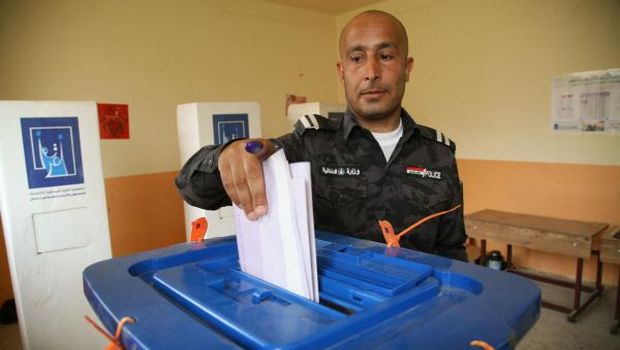
An Iraqi policeman casts his ballot at a polling station in the city of Ramadi, west of the capital Baghdad, on April 28, 2014, as members of the Iraqi security forces vote in the country’s first election since the departure of US troops in late 2011. (AFP Photo/Azher Shallal)
London, Dubai and Amman, Asharq Al-Awsat—Iraq’s military, police, and medical staff began to cast votes in the country’s general election on Monday, despite attempts by militants to disrupt this week’s polls.
A string of attacks were reported on security checkpoints and polling stations across the country killing more than 20 people, according to news agencies, as members of Iraq’s million-strong security forces were joined by hospital staff and patients in casting early ballots, allowing them to be on duty when the rest of Iraq’s 22 million voters go the polls on Wednesday.
The deadliest reported attacks took place in the country’s north, at the town of Tuz Khormato and the city of Kirkuk, where suicide bombers attacked security checkpoints outside polling stations, killing six security forces members in each attack, and wounding several more.
The capital of Baghdad was also rocked by suicide bombings, including the districts of Azamiyah and Mansour, each of which killed several soldiers and police officers.
Monday also marked the second day of voting for Iraqi expatriates abroad, who began casting their votes on Sunday in over 20 countries worldwide.
Speaking on Sunday, officials of Iraq’s Higher Independent Electoral Commission said the voting process was running smoothly at the offices outside the country, although voters in the UAE complained about being prevented from voting for “unknown” reasons.
The head of elections administration at the Electoral Commission, Miqdad Al-Sharifi, announced the start of the elections in a number of countries in the early hours of Sunday, Iraq local time. He said the first country where Iraqis began to vote was New Zealand—where voting opened after midnight Baghdad time—followed by Australia.
Sharifi added that the Commission’s offices abroad opened 103 elections centers, providing 656 polling stations, and that Iraqis abroad will continue voting on Monday, while army and police personnel will start voting on Monday and continue on Tuesday.
Meanwhile, voting in the UK opened at 9:00 am local time at two voting centers in London, and one each in the cities of Glasgow, Manchester and Birmingham.
The director of the Electoral Commission’s office in Britain, Amjad Mohamed Reda, told Asharq Al-Awsat that the election process “was running smoothly and no problems were reported.”
“We have procedures regarding the required documents and the voters showed understanding of these requirements,” he added. Two of the basic Iraqi identity documents were required to cast a vote: an Iraqi passport, the Civil Status ID, the Nationality Document, and the 1957 Census Register Document. Reda said if a voter only had one document, a foreign passport or driving license would also be accepted.
Reda added there were no records of the number of voters yet as “registration and voting were carried out on the same day.” He said that 3,000 voters had turned out in the first three hours after the polls opened, and many more were expected.
Meanwhile, the director of the Emirati electoral office, Omar Al-Hadith, told the French news agency AFP that voting was taking place in two polling stations in Abu Dhabi and Dubai.
“There are no elections centers in the Gulf except in the UAE,” he said. “[These] should cover all Iraqis in the Gulf area.”
Hadith added that the official numbers provided by the consular services and the Emirati authorities showed that more than 52,000 Iraqis lived in the UAE, including 20,000–25,000 voters.
However, a number of voters in Gulf countries said they were unable to vote for reasons that were not made clear. Salam Anwar, an Iraqi who arrived in Dubai from Qatar, said: “We came this morning and queued in the sun with women and children and we were not allowed to vote.”
Anwar said some officials at the election center said the voting ban came from the UAE authorities, while others said the reason was a decision by the Iraqi Electoral Commission.
Hundreds of voters arrived at the Dubai election center, while turnout was expected to increase in the afternoon and evening.
Lina Mushtaq, an Iraqi woman living in the UAE, said after voting that “I want to see my country rise again, become prominent again, and to be a leading country again.”
Meanwhile, hundreds of the estimated 200,000 Iraqis resident in Jordan also went to polling stations in the Kingdom on Sunday, according to Reuters. Mohamed Samerrai said he hoped the elections would result in change in Iraq, and that the election turnout was great, the same as the hopes for a change of the current situation in the political arena.
Another Iraqi voter called Shahlaa, said she looked forward to a positive change, and that voters did not demand much more than security and safety, and called on MPs to fight corruption.
There are 14 election centers in Jordan, including 11 in Amman, one in Irbid, and two in Zarqa.
